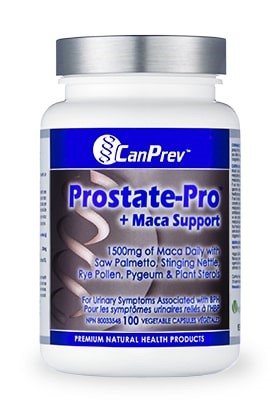Prostate-pro + Maca Support
CanPrev
Prostate-Pro + Maca Support
195240
100 cap
Couldn't load pickup availability
Similar Categories
- Reduces prostate swelling
- Improves urinary system complaints
- Supports optimal prostate health and libido
- Provides 1,500mg of Maca per dose
The prostate is a small, walnut-shaped gland in men located near the bladder. Its job is to produce seminal fluid that nourishes and transports sperm. Prostate enlargement, or benign prostatic hyperplasia (BPH), happens to most men as they age. As the prostate gets bigger, it presses on the urethra and can cause bladder and urination problems.
BHP begins in the inner prostate and keeps expanding inward towards the core and tightening around the urethra, affecting urination. Prostate-Pro + Maca Support helps to relieve urologic symptoms associated with early stages of benign prostatic hyperplasia, including difficulty urinating, weak urine flow, incomplete voiding and frequent day and nighttime urination.
Each capsule contains
| Maca extract root 0.6% glucosinolates | 375mg |
| Saw palmetto extract 45% free fatty acids | 140mg |
| Stinging nettle extract 5:1 | 50mg |
| Rye pollen extract 20:1 | 31.3mg |
| American ginseng extract 20% ginsenosides | 30mg |
| Selenium yeast (0.2% elemental) | 50mcg |
| Pygeum africanum extract 15:1 | 18.8mg |
| Beta-sitosterols 40% (soy) | 15mg |
| Zinc citrate (30% elemental) | 7.5mg |
| Tomato extract (fruit, 5% lycopene) | 7.5mg |
| Vitamin D3 (cholecalciferol) | 100IU |
Prostate-Pro + Maca Support is formulated to help relieve urologic symptoms associated with early stages of benign prostatic hyperplasia.
Adult men - Take 2 capsules 2 times per day with food, a few hours before or after taking other medications. Consult a healthcare practitioner for use beyond 3 months.
Caution advised when used concurrently with antidepressants, blood thinners or digoxin.
Caution advised with medical conditions including diabetes and high blood pressure. Caution advised when there is a history of non-melanoma skin cancer. Must exclude a diagnosis of prostate cancer prior to use.
Zinc supplementation can cause a copper deficiency.




